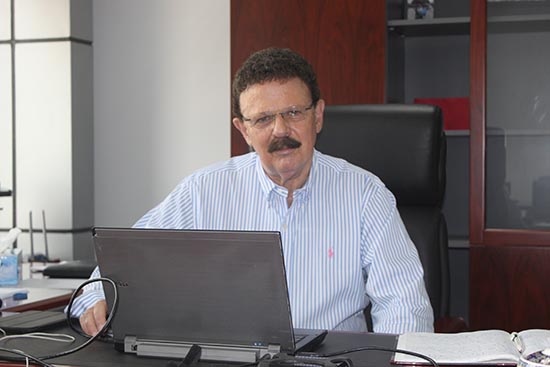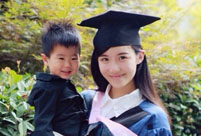 High speed train attendants receive training in Chongqing
High speed train attendants receive training in Chongqing
 Rare rainbow clouds seen in Fujian
Rare rainbow clouds seen in Fujian
 Small bracelet going global
Small bracelet going global
 Aerial Photography: Amazing Tianshan Mountains
Aerial Photography: Amazing Tianshan Mountains
 'Animals' in 2014 World Cup
'Animals' in 2014 World Cup
 Not afraid of death
Not afraid of death
 Chen Guangbiao ads on A15 of NYT to host charity luncheon for 1,000 poor and destitute Americans
Chen Guangbiao ads on A15 of NYT to host charity luncheon for 1,000 poor and destitute Americans
 Passionate bar babies and fans feel the charm of World Cup 2014
Passionate bar babies and fans feel the charm of World Cup 2014
 US aircraft carrier docks in HK, welcomes PLA aboard
US aircraft carrier docks in HK, welcomes PLA aboard
 Graduation season: 'Take graduation photos to mark our love'
Graduation season: 'Take graduation photos to mark our love'
 |
| Robert O. Ritchie, a professor in University of California, Berkeley and the chief scientist of Lawrence Berkeley National Laboratory. (People's Daily Online) |
Robert O. Ritchie talked with confidence and assurance to a reporter from People's Daily in his office in the new main building in Beihang University. "A study on the structure of scales enables us to make more solid armor, while research on the plantar structure of the gecko enhances our capabilities in terms of the stickiness of glue," he said. "Thus, why not create new materials featuring bright colors based on research into butterflies' wings. I am always amazed that we have these animals in our great nature and enjoy inventing new artificial materials based upon research into their structures."
Ritchie, a tall man with thick brown curls, has calm and wisdom in eyes veiled by rimless glasses. He is not only a professor in University of California, Berkeley and the chief scientist of Lawrence Berkeley National Laboratory, but also an internationally acclaimed expert in fatigue and fracture of materials and an academician of the National Academy of Engineering (USA) and Royal Academy of Engineering (UK). He has won more than thirty prizes, written fifteen books in collaboration with others, and published more than five hundred papers.
Ritchie, one of the few Americans with no facebook accounts, has little time for leisure. He prefers to stay in the libratory or the office and keep in contact with his fellow scientists during the day. In that sense, he is a typical scientific researcher.
The cooperation between Ritchie and Beihang University grew following an academic conference. He was appointed an honorary professor of Beihang University in 2009 and recruited into the sixth "Thousand Talents" program in 2011. In September 2012 he was invited to head the International Research Center for Biological and Nature-Inspired Materials of the International Research Institute for Multidisciplinary Science (IRIMS), which was founded by Beihang on the basis of the innovative and venture bases for overseas top talents. Ritchie says that he "made the right choice" by joining the institute. He believes that the importance of interdisciplinary science lies in the fact that the innovations often emerge at the border of two fields, and this new job, related to his academic research in University of California, Berkeley, has provided him with a brand new platform.
Ritchie sees the "Thousand Talents" program as a huge success in the sense that it has not only attracted top-notch Chinese talent back home from overseas, but also helped recruit many foreign experts. He urges the Chinese government to encourage the foreign experts to become involved in innovation or start businesses, help them to overcome language and cultural barriers, and to invest more in the "Thousand Talents" program.
"The 21st century is the century of Asia. Asian countries must ensure their creative capacity for development. It is generally known that Asian nations are capable of making better products. At the same time we are not sure whether Asian countries can enhance their capacity for innovation. Asian countries are facing the challenge of growing thier innovation capability", Ritchie stresses. "Foreign experts will come to work in China on condition that China has real capacity for innovation and offers them exciting jobs."
Education is the soil that fosters such capability. Some institutions of higher learning such as Tsinghua University are striving to build world-class universities, and China has surpassed most other nations in the field of scientific research. Ten years ago, there were few Chinese papers in key scientific journals while today, many Chinese papers get published in these journals, some of which are very good. China's educational community should not be afraid of failure and should promote equal exchanges between teachers and students in the pursuit of improving the capacity for innovation, Ritchie added.
During the conversation he emphasized the importance of cooperation. He was very impressed by the cooperation among scientific researchers in China. A scholar from the University of Science and Technology Beijing came all the way to his laboratory and provided him with a special material which he desperately needed for an experiment, free of charge.
He makes several visits to China every year and thus China has become his oriental home. After work, he relaxes in a bar with his colleagues near the university, where he enjoys a drink and shares experiences of scientific research. These exchanges inspire a great many new ideas. "I have good relationships with my Chinese colleagues. Many colleagues of mine have already achieved remarkable successes," Ritchie says. He showered praise on several students from Beihang University who were his assistants, and expressed his hope that they would have a bright future - they were just as smart and diligent as any of his former students.
He believes China's infrastructure projects overseas provide important opportunities to expand the application of material science in China. Ritchie told the reporters: "Precious orchids will bloom as long as you are willing to spend time and energy cultivating the seeds. Today, I am planting the seeds in China. Material science will be full of vitality and make its contribution to transforming China into an innovative country."
This article was edited and translated from 《在中国培育创新的种子(中国,我的第二故乡)》, author: Ji Peijuan, source :People's Daily.
 Female master poses for graduation photos with son
Female master poses for graduation photos with son Silk Road, China's Grand Canal listed as World Heritage Sites
Silk Road, China's Grand Canal listed as World Heritage Sites PKU students imitate famous paintings in real-person photos
PKU students imitate famous paintings in real-person photos Chinese 'Slumdog Millionaire'
Chinese 'Slumdog Millionaire' Puzhehei: land of idyllic beauty
Puzhehei: land of idyllic beauty Stewardesses in Brazilian soccer jerseys
Stewardesses in Brazilian soccer jerseys Chinese navy fleet visits Cape Town, South Africa
Chinese navy fleet visits Cape Town, South Africa PLA naval cadets toss their hats at graduation ceremony
PLA naval cadets toss their hats at graduation ceremony Graduation photo ideas: reliable alumnus and happy alumna
Graduation photo ideas: reliable alumnus and happy alumna Islands in S. China Sea better shown on new vertical atlas of China
Islands in S. China Sea better shown on new vertical atlas of China Girl takes father’s portrait to travel the world
Girl takes father’s portrait to travel the world Images of Xi'an: Part one
Images of Xi'an: Part one In Pictures: Female fans of World Cup
In Pictures: Female fans of World Cup Top 20 hottest women in the world in 2014
Top 20 hottest women in the world in 2014  China's top 10 representative architectures
China's top 10 representative architecturesDay|Week|Month